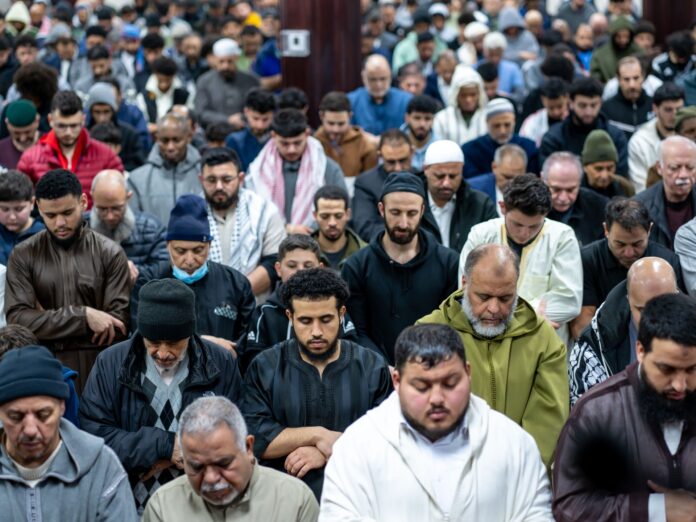Malika Bass converted to Islam a week before Ramadan began at Thabaat, an Islamic organisation housed at the Miftaah Institute in Warren, Michigan. She expressed her excitement at discovering “community” as a new Muslim, but also feels the heartache that permeates the air at most iftar gatherings and lectures she’s joined.
“It’s debilitating thinking about what these mothers are going through,” she said. “It’s debilitating, you can’t stop crying.”
As a mother, Bass said she can’t fathom the pain of the mothers of Gaza, but she’s found solace in verses in the Quran that she’s learning about. One verse that struck her in particular is: “Never think of those martyred in the cause of Allah as dead. In fact, they are alive with their Lord, well provided for.”
People of varying religious faiths around the world have responded to appeals to “fast with Gaza” during Ramadan as a gesture of solidarity. Mosques have cancelled traditional events to focus on fundraising for Gaza, and Muslims in the US have told reporters that they’ve shuttled the customary decorations for their homes out of concern that it might seem garish this year.
Last week in Wisconsin, nearly 50,000 voters chose “uninstructed” – the state’s version of “uncommitted” – as part of a growing campaign in the US in which protesters are using the ballot to voice displeasure with US President Joe Biden’s handling of Israel’s siege; Michigan introduced the tactic in the state’s Democratic primary in February. The White House last week cancelled its annual iftar dinner after Muslim leaders declined to attend.
“The American Muslim community said very early on that it would be completely unacceptable for us to break bread with the very same White House that is enabling the Israeli government to starve and slaughter the Palestinian people in Gaza,” Edward Ahmed Mitchell, the deputy director of the Council on American-Islamic Relations, told Al Jazeera.
Savanna Vela, 25, grew up in a Catholic household in Dearborn and chose for the first time to fast this month “with purpose”. She’s no stranger to fasting, since her friends and some family members are practicing Muslims and she’s participated with them in the past, but this year is different for her.
“Seeing this genocide unfold, quite literally, at the tip of [our] fingers has been the most horrific thing a lot of us have ever witnessed,” she said. “Seeing that over one million Palestinians are now at risk of starvation, [fasting] just feels like something that I can do to show my support.”
Vela has also been active on social media in an attempt to raise awareness, joined local protests and is boycotting consumer products that support Israel financially. She said she’s long been familiar with the history of the occupied territories but now she feels obliged to advocate for Palestinians, especially since she lives among so many Arab Americans in metropolitan Detroit.
“It just does not feel right to me to be a part of this community, to observe their holidays, to eat their foods, and date their men … but not advocate and not speak out and be on the side of the Palestinian people,” she said.
Fasting has shown her how strong the people of Gaza are, where some Muslims are still fasting despite the lack of food to break their fasts with. Northern Gaza is at risk of famine, and more than 70 percent of Gaza’s population is facing catastrophic hunger, according to the United Nations.
Vela said she’s always struggled with her faith but seeing the videos coming out of Gaza of broken mothers and fathers crying out to God over the deaths of their children has rekindled something in her.
“They put their entire soul, all of their trust, into Allah, and that made me reconsider my relationship with God, and how I’ve blamed him for so many things and turned my back on him, but then to see thousands and millions of Palestinians turn to Him, and seek answers and still hold him as the most glorified is admirable and inspiring,” she said.
Yasmeen Hamed, who began wearing her hijab on the first day of Ramadan, is known in her community for her decades of work with the Palestine Children’s Relief Fund’s Detroit chapter and for managing the social media accounts of her TikTok famous son, Ibrahim, who has cerebral palsy.
As part of her volunteer work, she’s hosted four Palestinian children at her home while they sought medical treatment at local hospitals. Despite the chaos, she continues to keep in touch with two of the young boys from Gaza that she hosted during the summer of 2017 and again in 2023 before the current hostilities began. In her interview with Al Jazeera, she marveled at the boys’ resilience, and their ability to find joy in the most difficult circumstances.
One of the boys, Muath, recently saw a photograph of Hamed on Facebook wearing her hijab.
“Muath actually sent me a beautiful message the other day,” she said. “Here he is living in a tent on top of his uncle’s house, because his house was bombed, and he’s telling me how happy he is for me and is congratulating me.”

